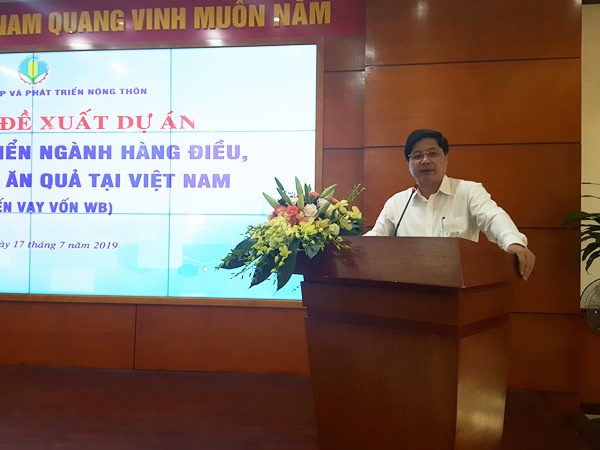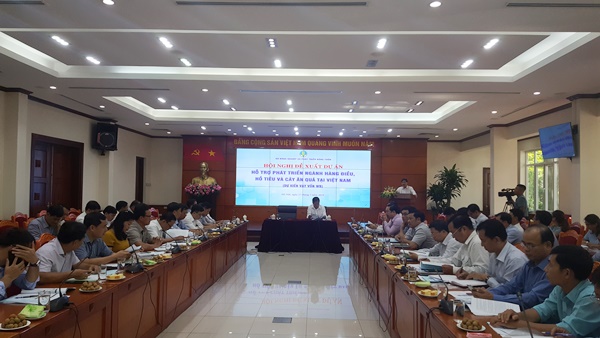- Giới thiệu
- Nhóm Công tác
- Tin tức
- Thông tin về FTA
- Tài Liệu
- Sự kiện
- Liên hệ
Discussion Workshop on the draft proposal of the Sustainable Development Project on Cashew, Pepper and Fruits in Vietnam
On July 17, in Hanoi, the Ministry of Agriculture and Rural Development organized a workshop to discuss the draft Proposal of the Sustainable Development Project on Cashew, Pepper and Fruits in Vietnam. The workshop was chaired by Vice Minister Le Quoc Doanh.

The Sustainable Development Project on Cashew, Pepper and Fruit in Vietnam will be implemented in a number of units under the Ministry of Agriculture and Rural Development, Cashew, Pepper and Fruit Associations and 15 provinces including: Binh Phuoc , Dak Lak, Dak Nong, Gia Lai, Quang Tri (for cashew and pepper) and Binh Thuan, An Giang, Hau Giang, Tien Giang, Soc Trang, Vinh Long, Hung Yen, Phu Tho and Son La, Tuyen Quang (in the fruit tree industry, which focuses on oranges, grapefruit, durian, longan, mango and dragon fruit). The project will also invest in logistics development including warehouse system, cold storage system, cool store to preserve fresh fruits at border gates with China (in provinces of Lao Cai, Quang Ninh and Lang Son).
At the conference, Vice Minister of Agriculture and Rural Development Le Quoc Doanh said that the two sectors, rice and coffe, were supported by the VNSAT project funded by the World Bank. The remaining three categories of cashew, pepper and fruit trees are also important sectors of Vietnam's agricultural sector. These are products with export value, but these sectors have many existing limits and need to be supported through capital funding, policy mechanisms, local participation including enterprises, cooperatives and farmers.
If the Sustainable Development Project on Cashew, Pepper and Fruits in Vietnam was approved, it would address the challenges facing these sectors. It is a matter of supplying quality cashew, pepper and fruit products to processing plants at competitive costs. In addition, the project would promote the production of high-quality cashew, pepper and fruit trees to meet the increasingly demanding export market requirements.
Another benefit of the project would be the improvement of basic infrastructure for agricultural and industrial activities such as access to energy, road networks and technology centers. Finally, it could adjust the supporting solutions for small and medium enterprises, including facilitating access to finance, taxes and other policy adjustments, creating more jobs for young people.

For cashew industry, Vietnam is now one of the three largest exporters of raw cashew nuts in the world. Although ranking in the top 3 for raw cashew production, Vietnam is leading the world in exporting cashew nuts for 10 consecutive years. The largest consumer market for Vietnam's cashew nuts is the United States, followed by China and the Netherlands. However, every year, Vietnam has to spend about 1 billion USD to import raw cashew nuts from Ivory Coast, Nigeria, Cambodia and some other countries. The government is planning to increase cashew production to reduce imports of raw cashew from abroad.
For fruit industry, the plantation area has been continuously increased, forming large-scale concentrated fruit tree areas, with an annual increase in export turnover. Vietnam is now the 3rd largest exporter of vegetables and fruits in the ASEAN region, after China and Thailand.
With pepper, from 2010 to now, Vietnam's pepper area has increased very fast. By the end of 2017, there were 153 thousand hectares, an increase of nearly 200% compared to 2010. Vietnam's pepper output reached 244 thousand tons in 2017, accounting for 50% of the world's pepper output. Currently, there are about 100 enterprises purchasing, processing and exporting pepper. The volume of export pepper reached US $ 1.12 billion. Export markets also expanded from 40 countries (2014) to over 90 countries.
The initiative for the Sustainable Development Project for cashew, pepper and fruit trees was established based on the conclusions of the Minister of Agriculture and Rural Development Nguyen Xuan Cuong at the Conference on Sustainable Development of cashew industry with a link to the global value chain. The overall objective of the project is to develop smart agriculture adaptable to climate change and improve the value chain for cashew, pepper, fruit trees towards modernized, synchronized direction, focusing on commodity production to provide diversified products with high quality and value added in some provinces in Vietnam.
Tin liên quan
PSAV Attends the 30th Anniversary Celebration of Cargill Vietnam2025/10/23
Plant health management helps increase coffee yield up to 15%2025/10/16
An Giang to host 2025 OCOP forum for sustainable development2025/09/25
Viet Nam and France foster cooperation on blue economy and sustainable environment2025/09/29
Agriculture and Environment exhibition ready for National celebration2025/08/27



 Điều lệ hoạt động
Điều lệ hoạt động



















































